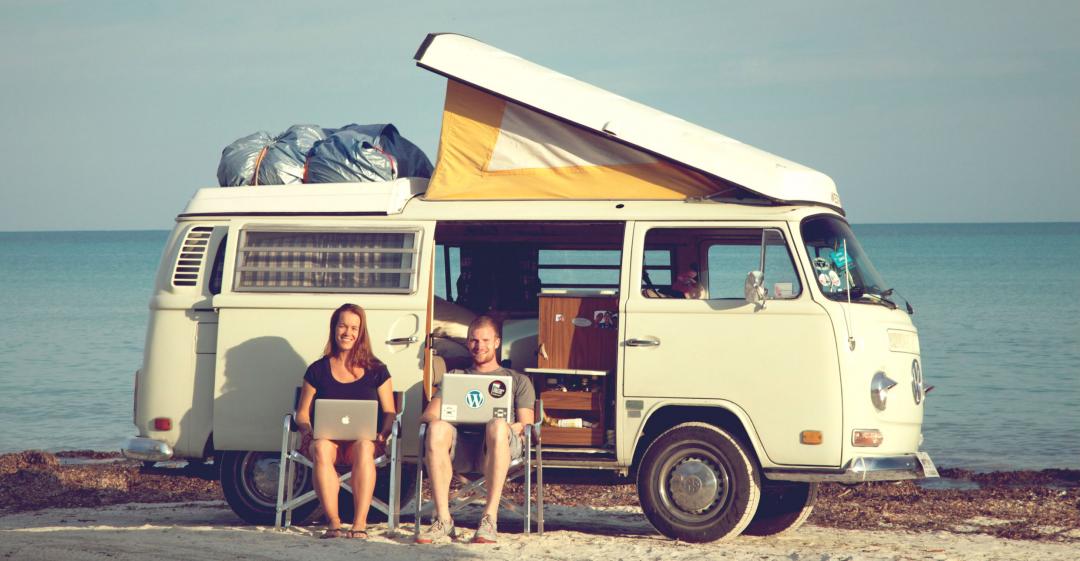“I'd started to value the wrong things, and I was feeling empty because of it.”

What work were you doing previously?
Corporate Communications.
I worked as Corporate Branding Officer, then Business Development Manager, for a large multinational chemical company in The Netherlands.
What are you doing now?
Lifestyle design and career change coaching, web development, online marketing, and teaching.
I'm also a triathlete, Ashtanga Vinyasa Yoga apprentice, and am travelling Central and South America in a VW bus while working remotely.
I'm doing all this with the most important person in my life, Steven Zwerink. Currently we are in Mexico.
Why did you change?
Life really is too short to do work that doesn't matter to you.
I felt unfulfilled, unable to use many of my talents in my job. I wasn't doing what I loved most. I'd started to value (in my opinion) the wrong things (money, status, 'stuff') and I was feeling empty because of it.
I wanted a life in which I felt alive every day, contributing something meaningful to the world and to the lives of people around me.
When was the moment you decided to make the change?
When one of my best friends got seriously ill and I went with her to the hospital.
My eyes opened as to how short life is and how quickly it can be over. That was five years into a corporate career and I knew I had to make a change.
Are you happy with the change?
Yes.
It's the best thing I ever did for myself and the world. I cannot see myself ever going back to a 9–5 job working for a boss, or even going back to life without roaming the world.
What do you miss and what don't you miss?
I miss my family and friends back home in The Netherlands.
I sometimes miss collaborating in a team – the inspiration, feedback and growth I experience from working closely with team mates while we create something together.
What I don't miss is the office, its routines, the 9–5, the money, the perceived security, the always being busy but never really having time for anything.
How did you go about making the shift?
It took about a year before I had the courage to tell my boss I didn't want this corporate career anymore.
I worked 70 hours a week in the chemical industry, making good money; my identity was very much tied up with my work. I was part of a 'talent pool' programme within the company; I knew that if I showed doubt about my career, that route would close off.
After a year of feeling unsure, one morning I felt I'd just had enough. I couldn't get myself out of bed anymore to go to work. That was it. I collected all of my courage, went to the office very early in the morning and told my boss.
I expected to be 'let go' immediately. Actually, the opposite happened. I was offered the opportunity to work part-time for six months, to get my business set up and find my first client. I took the offer with both hands and considered it an experiment.
Over the years I'd internalised that it's wrong to fail, that failure should be avoided at all costs. But because experiments often fail, my perspective of experimenting, rather than making a daunting lifestyle change, helped me learn how to be comfortable with taking risks and the possibility of failure.
This shift in thinking took me out of my comfort zone and helped me on my way. Little experiments, like writing my first blog posts about my vision and views of the field I wanted to move into, mini projects that helped me learn how to code, interviewing people, and speaking in public, all helped me find my first client and move into entrepreneurship after those six months.
How did you handle your finances to make your change possible?
For those six part-time months, I received half my usual salary, which was enough to survive.
I drastically toned down my lifestyle. I also had savings.
I kept my mobile phone usage right down (eventually moving all mobile traffic to WiFi and apps like Skype and Telegram), sub-let my property, found a much cheaper place to rent, and invited friends over to cook together instead of eating out.
All of this lead to an easier transition.
What was the most difficult thing about changing?
Discovering who I really am.
I had very much identified my 'self' with the work I did. When someone asked me ‘Who are you?’, I would say my name and start telling them about my work. I had to rediscover what I liked to do, what I got excited about, what my talents were and how I wanted to contribute to the world. I had to learn to quiet the negative, down-talking thoughts in my head.
The second most difficult thing about changing was, and continues to be, the challenge of dealing with the opinions and remarks of people who knew me from before the shift. I'm always justifying myself: why I live on the road without one regular job ("You must come back one day"), and how long I'm planning to continue to live like this ("Wait until you have kids; you'll see you can't continue this way").
People's remarks are often aimed at bringing me back to the straight and predetermined path we are all 'supposed' to follow in our society. There is quite a bit of judgement; sometimes I find that difficult to deal with.
What help did you get? 
I've always had a lot of support from my family and close friends.
Most of all, I received a lot of support and coaching from my partner, who in the same year also quit his corporate career and started his own entrepreneurial journey.
What have you learnt in the process?
That it is of utmost importance to "follow your bliss", as Joseph Campbell said.
I've learnt to recognise an adventure when it calls me, to have the courage to trust and act upon my feelings, and to chase the things that make me feel most alive (as opposed to allowing logical reasoning to steer all the decision making). This has been the single most important thing this process has taught me.
What do you wish you'd done differently?
Looking back, I could have made the change even earlier than five years into my corporate career.
I had drifted far away from who I was; there's no way I will ever do that again for the sake of a career.
I don't have any regrets. You don't regret your adventures when you're following whatever makes you most happy. Since I made the change, things have happened for me at the right moments in time. I acted on what came my way and trusted that it would be alright in the end. Because if it's not alright, it's not the end. (I don’t know who said that, but I love the quote.)
What would you advise others to do in the same situation?
No two situations are alike; everyone has a different and equally exciting path to a more fulfilling life.
I'd encourage people who find it a challenge (like I did) to overcome old patterns and spiralling, negative thoughts, to view the change ahead as an experiment, rather than something you have to do for the rest of your life. Take a chance and try something you really love to do!
There's no way of knowing where your experiment will lead you. The goal is to get closer to what makes you come alive. Go do that!
What resources would you recommend to others?
I have found and still find inspiration in the websites of Escape the City, Chris Guillebeau, Impossible HQ, Derek Sivers, and Collective Evolution.
In a period of transition into something new, I'm inspired by the movies I'm Fine, Thanks (directed by Grant Peelle, 2012), I Am (Tom Shadyac, 2010), and most of all Finding Joe (Patrick Takaya Solomon, 2011).
A big part of my actually doing something about my life situation in 2009 was inspired by the book Whatever you think, think the opposite by Paul Arden.
If you'd like to read more about Diana's journey, please visit www.digitalnomadz.nl
What lessons could you take from Diana's story to use in your own career change? Let us know in the comments below.



